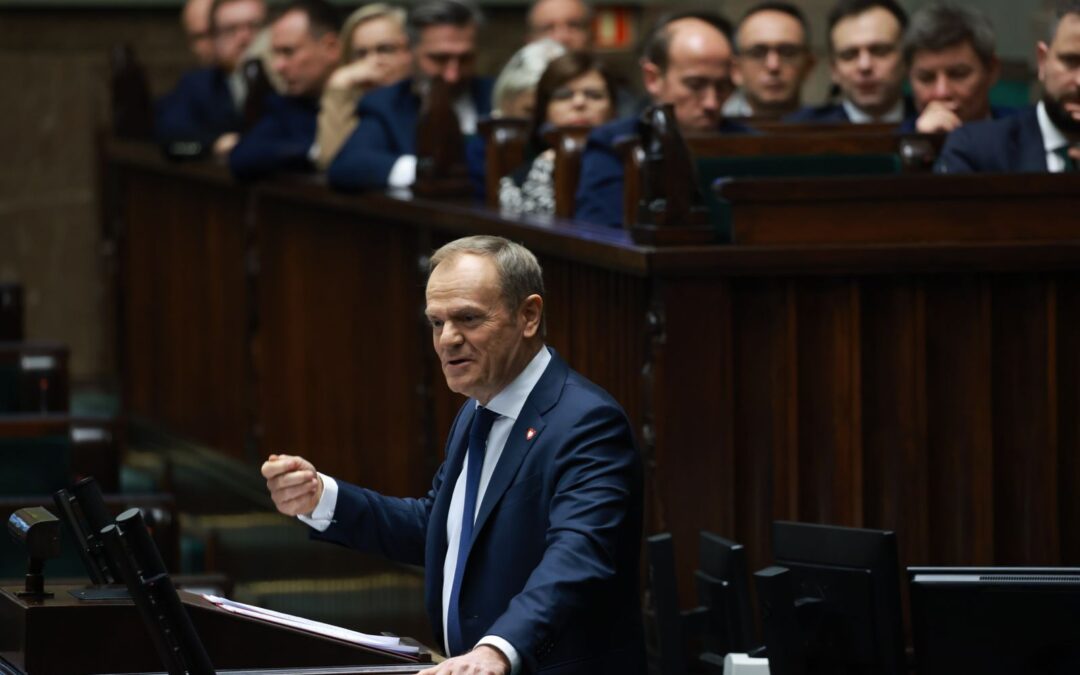Three ministers from Poland’s government are set to leave office just months after taking up their positions in order to become members of the European Parliament. One of them has already announced his resignation.
The trio – culture minister Bartłomiej Sienkiewicz, interior minister Marcin Kierwiński and state assets minister Borys Budka – were today named as top candidates on the electoral lists of Civic Coalition (KO), Poland’s main ruling group, making it almost certain they will become MEPs at June’s European elections.
Sienkiewicz, who is heading KO’s electoral list in the Małopolska and Świętokrzyskie constituency, announced that, as a result of his nomination, he was handing his resignation as culture minister to Donald Tusk, who is prime minister and also the leader of KO.
W związku z zatwierdzeniem przez Radę Krajową PO list kandydatów do Parlamentu Europejskiego, złożyłem na ręce premiera Donalda Tuska rezygnację z pełnienia funkcji Ministra Kultury i Dziedzictwa Narodowego.
— Bartłomiej Sienkiewicz (@BartSienkiewicz) April 24, 2024
It had long been rumours that Sienkiewicz, who has little background in culture but is a longstanding ally of Tusk, was appointed as culture minister in December only on a short-term basis before standing for the European Parliament.
He was tasked in particular with leading the new government’s controversial move to remove the influence of the former ruling Law and Justice (PiS) party over public media. That was a mission he has largely achieved, though in a manner that has raised many legal question marks.
Meanwhile, Budka, who will head KO’s electoral list in the Silesia constituency, said that when campaigning starts – probably in early May – he would resign as state assets minister to ensure that “the election campaign will be separated from the government”, reports the Polish Press Agency (PAP).
Kierwiński, the top candidate in the Warsaw constituency, has not commented on his nomination but is also expected to resign as interior minister. Like Sienkiewicz, both Budka and Kierwiński became ministers in December when Tusk formed a new coalition government that replaced PiS in power.
A court has confirmed the government's move to put state broadcaster TVP into liquidation in December as part of its efforts to take back control of public media from the former ruling PiS party https://t.co/AYHAwZXO7M
— Notes from Poland 🇵🇱 (@notesfrompoland) April 9, 2024
Announcing KO’s electoral lists today, Tusk said that the strength of the candidates reflected the fact that “these elections are one of the most important in the post-war history of Poland, even though it is the European Parliament”.
He explained that, after a “beautiful period” in which Europe had enjoyed peace, many were living under the illusion that it would be like this “forever and ever”. But recent events have shown that this is not the case.
“We have a great battle to fight, which will determine whether we will end up in a war,” said Tusk, quoted by the Gazeta Wyborcza daily. “Without a strong, united West, Ukraine will not win the war…[and] Russia will not stop in Ukraine.”
“Border protection [from] illegal immigration, an iron dome [of missile defence] over Europe: the EU must become a bastion,” added the Polish prime minister.
Poland says it will "fight to be exempted" from the relocation system for asylum seekers under the EU's migration pact
It argues Poland has a “unique” situation due to the migration crisis on its border with Belarus and its reception of Ukrainian refugees https://t.co/kSiMYl23G2
— Notes from Poland 🇵🇱 (@notesfrompoland) March 5, 2024
In polling of general party support, Tusk’s centrist KO is currently leading with an average of 32.4% support this month, ahead of the national-conservative PiS on 29.5%, according to polling aggregator Ewybory.
One of KO’s ruling coalition allies, the centre-right Third Way (Trzecia Droga), follows on 11.6% ahead of the far-right Confederation (Konfederacja) on 9.5%. The other of Tusk’s coalition partners, The Left (Left), trails on 8%.
However, in local elections that took place across the country earlier this month, PiS won the highest proportion of votes, 34.3%, ahead of KO on 30.6%
Official results from yesterday's local elections have been announced.
PiS, the main national opposition party, won the highest overall share of the vote (34%) but Prime Minister Donald Tusk's KO emerged as the largest group in most provincial parliaments https://t.co/1WITwHupHF
— Notes from Poland 🇵🇱 (@notesfrompoland) April 8, 2024

Notes from Poland is run by a small editorial team and published by an independent, non-profit foundation that is funded through donations from our readers. We cannot do what we do without your support.
Main image credit: KPRM (under CC BY-NC-ND 3.0 PL)

Daniel Tilles is editor-in-chief of Notes from Poland. He has written on Polish affairs for a wide range of publications, including Foreign Policy, POLITICO Europe, EUobserver and Dziennik Gazeta Prawna.



















